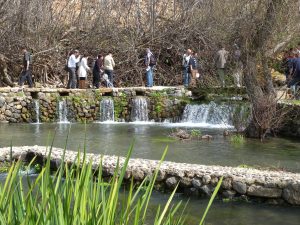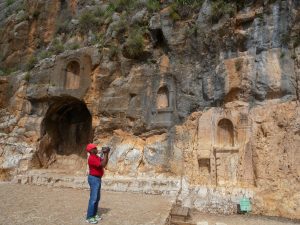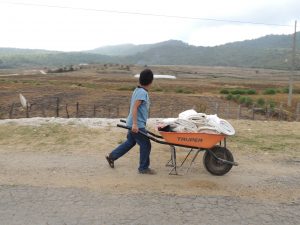On Being Church
(Isaiah 22:15, 19-23; Psalm 138; Romans 11:33-36; Matthew 16:13-20)
*************************************************************
Here is a quiz for you. CH – – CH: What’s missing? The answer is “U” “R”. Without you, the Church is incomplete.
The Gospel today speaks not only of who Jesus is for us, but also of who we are for Jesus as his Body, the Church.
Caesarea Philippi is found in mountainous northeastern Palestine, near the border of Lebanon and Syria. It is there that the movie The Syrian Bride, which portrays the dilemma of a Jewish-Arab couple who fall in love and marry, was filmed.

Headwaters of the Jordan at Caesarea Philippi
It is noteworthy that the setting for the question that Jesus asked his disciples about his identity is Caesarea Philippi. This spot was the center of pagan worship and home of ancient Syrian Baal worship, strewn with fourteen temples. There is still a rock cavern there in honor of the birth of the great god Pan, so much so that the place was called Panias. The spring that issues forth from that cave is actually the headwaters of the Jordan. There was also a great white temple built on these rocks by Herod to the godhead of Caesar. Herod’s son Philip changed the name to Caesarea (Caesar’s town), and Philippi after himself, and enriched the temple. One can still see the remnants of the altars and niches carved in rock of the ancient pagan gods that were worshipped there, including dancing goats.

Niches carved in rock used to worship pagan gods
While back in Jerusalem the orthodox Jewish leaders were plotting to kill Jesus as a heretic, he stands with the twelve apostles in the midst of the ruins and splendor of the gods and religions of Greece and the emperor worship of Rome where the history of Israel found a focus. Here in Caesarea Philippi, Jesus asks those who follow him who they believe him to be and expects an answer. It is as if Jesus deliberately set himself against the background of the world’s religions in all their history and their splendour, demanded to be compared with them and expected to have the verdict given in his favor.

Jordan River with the cave to the god Pan in the background
In Matthew, unlike Mark or Luke, Peter responds that Jesus is not only Messiah, but also “Son of God,” reflecting a high point of Matthew’s Christology. Neither petros nor kephas was used as a personal name before Jesus conferred it on the apostle. The Hebrew qahal and the Greek ecclesia means an “assembly called together”. In the Old Testament, it refers to the community of the chosen people. It is now adopted to refer to the community of the new alliance sealed with the blood of Jesus. By using the term community along with the term kingdom of heaven, Jesus shows that the eschatological community of the end-times has its beginnings here on earth as an organized society whose leader he now appoints. The Church’s task is to rescue the elect from death’s dominion and lead them into the kingdom of heaven. The promise of Jesus holds good for today because Jesus intended to provide for the future of his community with a structure that would not collapse with Peter’s death.
There are few scenes in the Bible where the consciousness of Jesus in his own divinity and in his entirely unique relationship with the Father as Son of God shines out with a more dazzling light. In addition, as messiah he is the anointed, the suffering servant of Isaiah, who will bring about a new creation through his passion, death and resurrection.
Peter’s inspired answer to Jesus’ question highlights his unique and fundamental role. It is more about Jesus’ faith in him than his faith in Jesus.
Peter is here paralleled to Abraham. Just as Abram stood at the beginning of the people of God, had his name changed, and was called a rock, so also Peter stands at the beginning of a new people of God and receives the Abrahamic name “rock.” Here, in the midst of rock that was used to worship pagan gods, Christ builds the Church on human leadership, weak and limited as the rock that is Peter may be.
Peter is given the keys to the kingdom of God. The Kingdom of God is the bottom line, the basic reality that Jesus came to initiate and to establish here on earth. This is a mind-boggling development that we can never fathom deeply enough. Through the life, ministry, death and resurrection of Jesus, the overwhelming gracious love of the Father, the Son and the Holy Spirit begins the reign of God here on earth. The peace, joy, right relationship and intimacy of the Blessed Trinity begins in us and among us.
It is upon faith in Jesus as messiah that the group that Jesus has formed will mature and grow. As long as this faith endures, the gates of Sheol will have no power over them. Through the keys, Peter is declared master of the ecclesia. Peter has a special place of authority in the Church, but the nature of that authority is not clear, other than that the keys to the kingdom signifies unbinding, forgiving and healing. The reason for the secrecy that Jesus enjoins on the disciples, known as the messianic secret, is that people would misunderstand Christ as king rather than as suffering messiah.
It is striking how there is a prefiguring of this gospel in the first reading from Isaiah. Eliakim, who displaces Shebna, is given authority and security. He would be spiritual father to Jerusalem and Judah. He was given the keys to the house of David to open and close. This prophetic link spanning centuries leaves us with the appropriate sentiments expressed by St. Paul in the second reading – how unfathomable and mysterious are the depths of God, for all things are from, through and in him.
This whole event is almost like a prelude to Pentecost that was the birth of the Church. There is a message for us here to truly take to heart that we are the new Qahal, the new Ecclesia, the Church, the Body of Christ, the People of God, who are to help inaugurate the reign of God here on earth by our actions, proclamation of the Good News and loving service to humanity.

The poor in whom we are to see Jesus
So, the question that Jesus puts before the disciples can also become “Who are we for Jesus?” How are we responding to Jesus as Messiah and Son of God? Is he first in our lives? Can we see him in others, and be Jesus for them? Are we promoting the growth of the reign of God here on earth by our unconditional love, forgiveness and genuine caring for others? Are we truly the Body of Christ as church? Are we the field hospital for the world that Pope Francis envisages?

The poor in San Cristobal, Chiapas, Mexico
The Eucharist is a kingdom meal that is also a prelude to the heavenly banquet that is to come. May our celebration today strengthen our commitment to be Church in the best sense of the word, recognizing who Jesus is, and helping to deepen the reign of God here on earth by being Jesus for others.



